|
|
|
Sort Order |
|
|
|
Items / Page
|
|
|
|
|
|
|
| Srl | Item |
| 1 |
ID:
137644
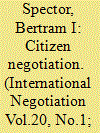

|
|
|
|
|
| Summary/Abstract |
Negotiation is becoming a more inclusive activity. More and different types of actors are taking part at national and international levels to resolve conflicts and seek agreement. At a national level, non-governmental organizations and individual citizens are partaking in mass demonstrations that often evolve into negotiation. At the international level, ngos working through issue networks have been participating more and more in formal negotiations with state parties. By reviewing several cases at these different levels, this article identifies useful questions for future research focusing on the sources of legitimacy and power of these new actors and how they are changing the organization, structure, process and outcomes of negotiation.
|
|
|
|
|
|
|
|
|
|
|
|
|
|
|
|
| 2 |
ID:
178172
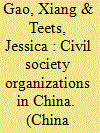

|
|
|
|
|
| Summary/Abstract |
This article examines how civil society organizations navigate local government to secure more inclusive environmental governance. Based on an in-depth case study of water governance in Zhejiang Province between 2012 and 2018, we find that Green Zhejiang, a civil society organization, exercised informal power to hold the local government accountable based on two strategies: mobilizing citizens to collect information on water pollution and strategically leveraging the authority of provincial government to find citizen-focused solutions. Most existing studies foreground one stage of the policy process – advocacy in the agenda-setting phase, policy entrepreneurship during the design phase, or monitoring during the implementation phase; however, we examine strategies of civil society organizations throughout this policy lifecycle. With this approach, we are able to analyse the strategic interactions between different levels of the government and civil society organizations and locate the positive outcomes and limits under the current governance system. Despite policy successes, Green Zhejiang still acts informally, which limits long-term effectiveness. However, incorporating citizens into public administration in a meaningful way requires sharing policymaking power formally, and thus far, local governments are only willing to share power in an ad hoc and informal way. More institutionalized citizen participation is necessary to develop innovative solutions to the severe environmental degradation in China.
|
|
|
|
|
|
|
|
|
|
|
|
|
|
|
|
| 3 |
ID:
113957
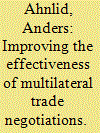

|
|
|
|
|
| Publication |
2012.
|
| Summary/Abstract |
The informal WTO ministerial meeting in July 2008 brought the long stalled Doha Round to the verge of a breakthrough. The reason for its final failure was substantive and not related to the negotiating procedures, which previously had contributed to meager results and failures in the round. The meeting was conducted using procedures that ensured a considerable amount of trustworthiness, transparency and legitimacy, which in turn contributed to effectiveness in the process. Thus, the meeting solved many, albeit not all, outstanding issues on the path towards agreement on so-called modalities for agriculture and industrial products, which in turn would have been necessary for a final successful conclusion of the Round. The 2008 July negotiations demonstrated that complex large-scale multilateral negotiations can be handled procedurally in an acceptable and successful way. The article advances a neglected interpretation of the July meeting, and provides lessons for both future WTO negotiations and multilateral negotiations in other policy areas.
|
|
|
|
|
|
|
|
|
|
|
|
|
|
|
|
| 4 |
ID:
133448
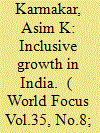

|
|
|
|
|
| Publication |
2014.
|
| Summary/Abstract |
The Twelfth Plan must be guided by a vision of India moving forward in a way with emphasis on inclusion and sustainability while minimising downside effects on growth that would ensure a broad-based improvement in living standards of all sections of the people through a growth process which is faster than in the past, more inclusive and also more environmentally sustainable. So the immediate task before the economy is to make growth more inclusive where inclusiveness implies the fast removal of poverty, generation of employment and equitable distribution of benefits of growth and human capability development.
|
|
|
|
|
|
|
|
|
|
|
|
|
|
|
|
| 5 |
ID:
102937
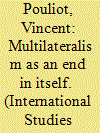

|
|
|
|
|
| Publication |
2011.
|
| Summary/Abstract |
Students and practitioners of world politics need to assess the value of multilateralism not only as a means to an end, but also as an end in and of itself. The functional view, according to which multilateral channels are worth pursuing only insofar as they allow actors to gain influence on the global stage or produce tangible and immediate results in fighting global harms, is incomplete. As a global governance practice characterized by an inclusive, institutionalized, and principled form of dialog, the multilateral procedure generates a number of processual benefits-mutually recognizable patterns of action, typically moderate solutions, and legitimate policies whose large ownership eases their effective implementation-which, taken together, strengthen the political impetus for global cooperation, regardless of the policies adopted. Routinized, nondiscriminatory, and comprehensive political dialog is a pragmatic template for enhancing global governance that can be implemented here and now, as recent developments at the United Nations indicate.
|
|
|
|
|
|
|
|
|
|
|
|
|
|
|
|
| 6 |
ID:
127658
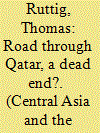

|
|
|
|
|
| Publication |
2013.
|
| Summary/Abstract |
While a military solution in Afghanistan has failed, the search for a political solution that includes the insurgent Taliban movement has not yielded any significant results, despite initial U.S.-Taliban contacts in Qatar in 2011 and 2012 originally facilitated by Germany. All contacts with the Taliban so far have been preliminary and exploratory and have not yet reached the "negotiations" stage. No substantial progress has been made so far in 2013 either. There are several other obstacles hindering the start of constructive negotiations, mainly: the U.S. approach that often sidelines the Afghan government, the Taliban's refusal to talk to the Afghan government and the Afghan government's lack of a clear strategy for such negotiations, as well as the general mistrust between the potential parties in the negotiations and the failure of all sides to recognize that talks with the Taliban constitute only one element of a political solution. After a period of extremely strained relations with Pakistan, the Afghan government is hoping for Pakistan's support to open a direct channel to the Taliban leadership, a demand formulated before President Karzai's August 2013 visit to Pakistan.
The current attempts of the Afghan and Pakistani governments to relocate, and in fact dismantle, the Taliban liaison office have, however, created an additional hurdle that will make substantial negotiations even less likely in the short term. The Taliban have already made it known that they do not want Pakistan and Saudi Arabia-both countries suggested by Kabul as a possible new location for the Taliban liaison office-to play a central role. A genuine political solution requires inclusiveness. As a first prerequisite to achieve this, the well-founded reservations of large sectors of Afghan civil society, including the organized women's movement, many young Afghans, and much of the political opposition against any talks with the Taliban and their future role in Afghan politics need to be taken seriously. Their most valid concern is that their own government and its international allies, who have already set the date for the "handover" and withdrawal from Afghanistan, might go for a quick political power-sharing deal between the Karzai government and the Taliban, thereby adding just one more armed faction to the conflict and not addressing the root causes of the conflicts in Afghanistan, of which insurgency is only one.
|
|
|
|
|
|
|
|
|
|
|
|
|
|
|
|
|
|
|
|
|